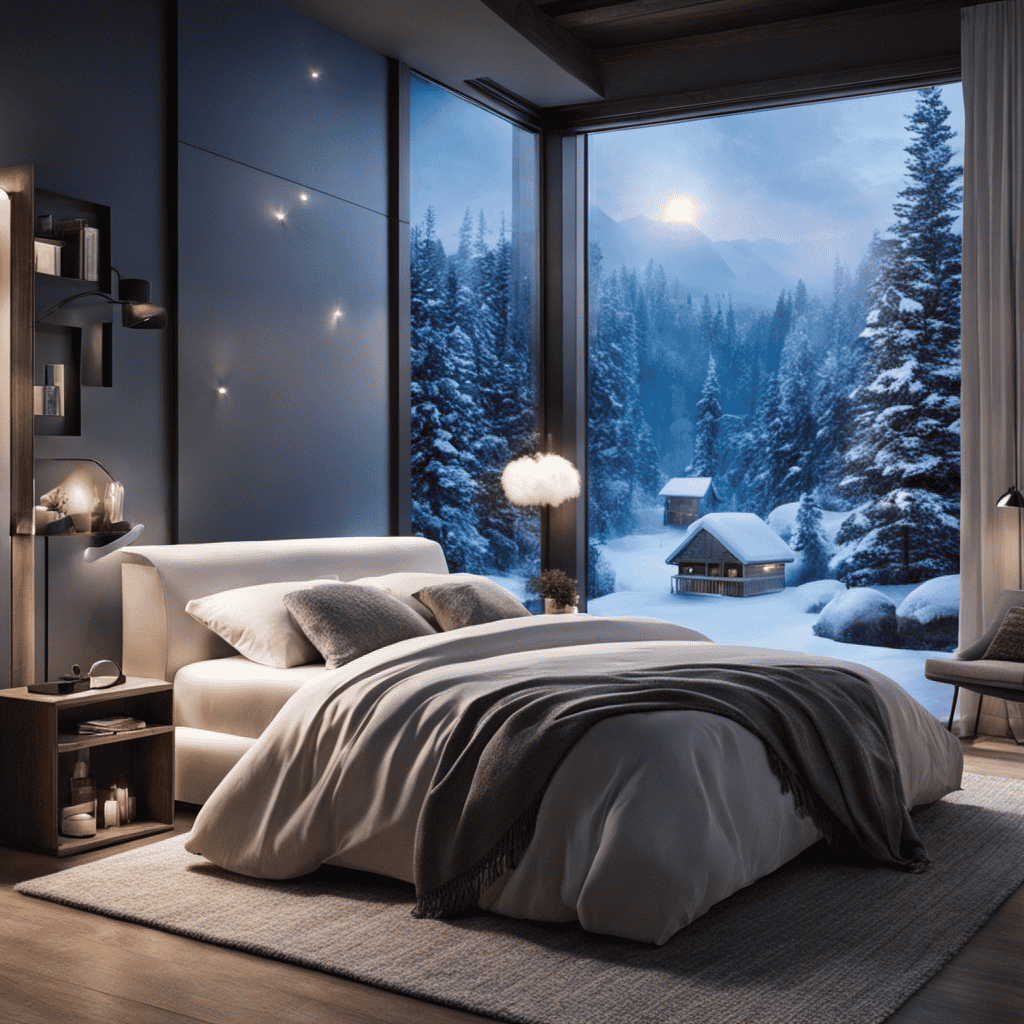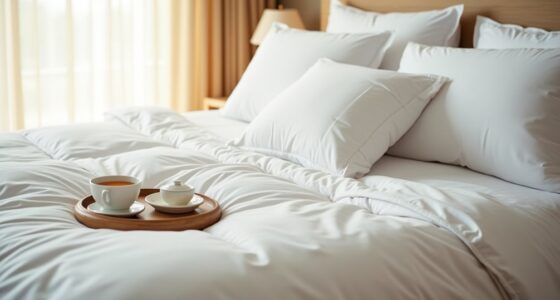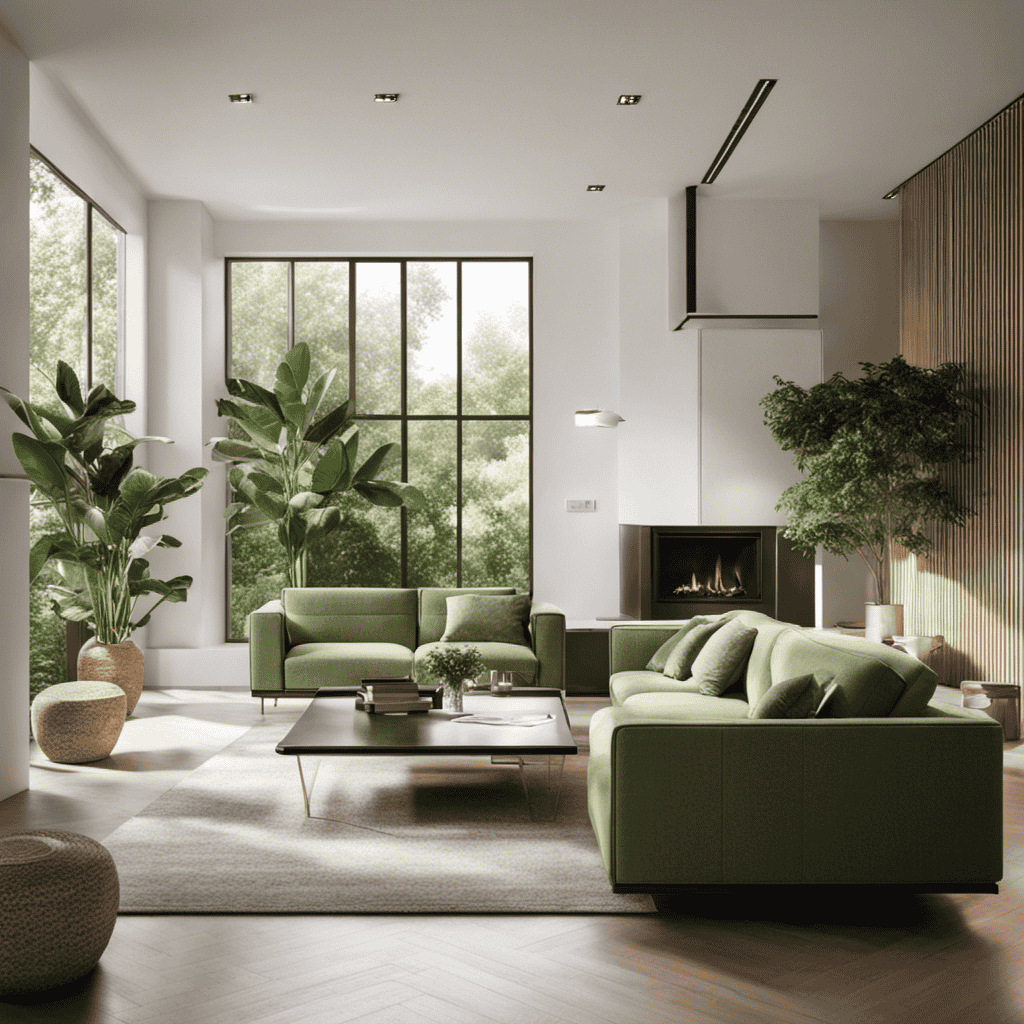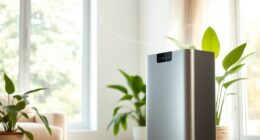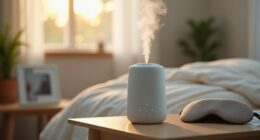As a person who often experiences colds, I recognize the significance of locating the top air purifier for alleviation.
Did you know that the air inside our homes can be up to five times more polluted than outdoor air? That’s why it’s crucial to invest in a high-quality air purifier that can effectively remove airborne particles and allergens.
In this article, I will provide you with research-based information and expert recommendations on the top air purifiers to use when you have a cold in 2017.
Key Takeaways
- Air purifiers with HEPA filters are crucial for removing airborne particles and allergens, making breathing easier and alleviating congestion.
- Activated carbon filters are effective in removing odors and chemicals, improving the overall air quality.
- Advanced technologies like ionizers, UV-C light, or electrostatic precipitation can enhance the air purifier’s effectiveness in removing germs and preventing the transmission of cold viruses.
- Consideration should be given to factors like noise level, size/portability options, and convenience features such as built-in handles, sleep-friendly settings, and battery-powered operation.
Benefits of Using an Air Purifier When You Have a Cold
Using an air purifier can help alleviate congestion and reduce the spread of germs when you have a cold.
Air purifiers are designed to improve indoor air quality by removing airborne particles such as dust, pollen, pet dander, and bacteria. These particles can exacerbate cold symptoms and prolong the duration of the illness.
By capturing and filtering these particles, air purifiers can provide relief from congestion and make breathing easier.
Additionally, air purifiers can help reduce the spread of germs by trapping viruses and bacteria in their filters, preventing them from circulating in the air. This can be especially beneficial in households with multiple occupants, as it can help prevent the transmission of cold viruses.
Overall, using an air purifier when you have a cold can improve your comfort and help speed up recovery.
Factors to Consider When Choosing an Air Purifier for Cold Relief
When choosing an air purifier for cold relief, there are several key factors to consider.
Firstly, filter effectiveness against allergens is crucial in ensuring that the air you breathe is clean and free from irritants.
Secondly, noise level considerations are important, especially if you plan on using the air purifier in your bedroom or other areas where quiet is essential.
Lastly, size and portability options should be taken into account, as you may want to move the air purifier from room to room depending on where you need it most.
Filter Effectiveness Against Allergens
To effectively combat allergens, you’ll want an air purifier with a high filter effectiveness. This is crucial for improving indoor air quality and reducing the symptoms of allergies.
When choosing an air purifier, consider the following factors:
-
HEPA Filter: Look for an air purifier that uses High Efficiency Particulate Air (HEPA) filters. These filters are capable of trapping 99.97% of airborne particles as small as 0.3 microns, including pollen, dust mites, pet dander, and mold spores.
-
Activated Carbon Filter: An activated carbon filter is effective in removing odors, chemicals, and volatile organic compounds (VOCs) from the air. This is especially important for individuals with chemical sensitivities or asthma.
-
Air Purifier Technology: Consider air purifiers that utilize advanced technologies like ionizers, UV-C light, or electrostatic precipitation. These technologies can further enhance the filter effectiveness and remove even smaller particles from the air.
-
Compliance with Air Quality Standards: Ensure that the air purifier meets or exceeds air quality standards set by reputable organizations such as the Environmental Protection Agency (EPA) or the American Lung Association (ALA).
Noise Level Considerations
The noise level of an air purifier is an important consideration for individuals seeking a quieter environment. When it comes to quiet operation, there are a few key features to look for.
First, choose an air purifier with a low decibel rating. Many models now offer a ‘quiet mode’ specifically designed for nighttime use.
Second, consider an air purifier with sleep-friendly features. Some models have a built-in timer that allows you to set the purifier to run for a specific amount of time, ensuring a peaceful night’s sleep without the constant hum of the machine.
Other models have a night mode that dims the lights and reduces the noise level even further.
Size and Portability Options
For individuals seeking a portable option, it’s important to consider the size and weight of the air purifier. Here are four key factors to keep in mind when evaluating air purifier size and portability options:
-
Compact Design: Look for air purifiers that are specifically designed to be small and lightweight, making them easy to move around and transport.
-
Carrying Handles: Opt for models that come with built-in handles or grips, as these make it much easier to lift and carry the purifier from one room to another.
-
Cord Length: Check the length of the power cord to ensure that it is long enough to reach the nearest power outlet without any hassle.
-
Battery Operation: Consider air purifiers that offer battery-powered operation, allowing you to use them even in areas without access to electricity.
Considering these factors will help you find an air purifier that is not only effective in purifying the air but also convenient to use and move around.
Now let’s explore the top 5 air purifiers for cold sufferers in 2017.
Top 5 Air Purifiers for Cold Sufferers in 2017
If you’re suffering from a cold, you should consider using one of these top 5 air purifiers in 2017. When it comes to air purifier technology, there are several cost-effective options available that can help improve the air quality in your home and provide relief from cold symptoms.
The first top air purifier is the Honeywell HPA300, which uses a True HEPA filter to remove 99.97% of airborne particles. Another great option is the GermGuardian AC4825, which combines a True HEPA filter with UV-C light technology to kill germs and bacteria. The Winix 5500-2 is also worth considering, as it uses a True HEPA filter and has a carbon filter to remove odors. The Alen BreatheSmart is known for its WhisperMax technology, which ensures quiet operation while still effectively purifying the air. Lastly, the Coway AP-1512HH is a compact option that uses a True HEPA filter and has a pollution sensor to automatically adjust the fan speed.
These top 5 air purifiers offer different features and price points, allowing you to choose the best option for your needs.
Now let’s explore how air purifiers can help alleviate cold symptoms.
How Air Purifiers Can Help Alleviate Cold Symptoms
When it comes to finding relief from cold symptoms, air purifiers can be a game-changer. These devices are designed to remove allergens and pollutants from the air, helping to improve indoor air quality and reduce the spread of germs.
Cold Symptom Relief
To alleviate your cold symptoms, you’ll want to consider using an air purifier specifically designed for capturing allergens and airborne viruses. Here are some key features to look for in an air purifier for cold relief:
-
True HEPA filter: This type of filter is highly effective at capturing tiny particles like dust, pollen, and pet dander, which can worsen cold symptoms.
-
Activated carbon filter: This filter helps to remove odors and chemicals from the air, providing a fresher and cleaner environment for cold sufferers.
-
Ultraviolet (UV) light: Some air purifiers come with UV lights that can kill bacteria, viruses, and mold spores, helping to reduce the spread of germs and prevent further infections.
-
Air quality indicator: Look for an air purifier with an indicator that monitors the air quality in real-time. This allows you to see the improvement in air quality as your cold symptoms lessen.
Using an air purifier with these features can provide significant relief from cold symptoms by reducing allergens, eliminating odors, and killing germs in the air. By improving the air quality in your home, you can promote faster recovery and better overall health.
Air Purifier Benefits
Investing in an air purifier with true HEPA filter, activated carbon filter, UV light, and air quality indicator can significantly improve the air quality in your home and promote better overall health.
Air purifier technology has advanced in recent years, allowing for more effective removal of airborne pollutants such as dust, pollen, pet dander, mold spores, and even harmful bacteria and viruses.
A true HEPA filter is capable of capturing particles as small as 0.3 microns, ensuring that the air you breathe is clean and free from harmful allergens and pollutants.
The activated carbon filter helps to remove odors and chemical vapors, while the UV light kills bacteria and viruses, further enhancing the air purification process.
Additionally, having an air quality indicator allows you to monitor and maintain the air quality in your home.
Improving Indoor Air
Improving indoor air quality is essential for maintaining a healthy home environment. Here are four ways you can improve air quality and reduce respiratory symptoms:
-
Keep your home clean: Regularly dust, vacuum, and mop to remove allergens and pollutants from your indoor environment.
-
Control humidity levels: High humidity can lead to mold growth, while low humidity can cause dryness and irritation. Use a dehumidifier or humidifier to maintain optimal levels.
-
Ventilate properly: Open windows and doors to allow fresh air to circulate and remove indoor pollutants. Use exhaust fans in bathrooms and kitchens to remove moisture and odors.
-
Use air purifiers: Air purifiers with HEPA filters can effectively remove airborne particles such as dust, pollen, pet dander, and mold spores, improving air quality and reducing respiratory symptoms.
By implementing these strategies, you can create a healthier indoor environment.
Now, let’s explore the features to look for in an air purifier for cold and flu season.
Features to Look for in an Air Purifier for Cold and Flu Season
One important feature to consider in an air purifier for cold and flu season is the ability to filter out airborne viruses and bacteria. This is crucial for preventing the spread of germs and maintaining a healthier indoor environment. In addition to this feature, there are other factors to consider when choosing an air purifier for cold and flu season. These include the size and coverage area of the purifier, the type of filter used (such as HEPA filters which are highly effective at capturing small particles), and the noise level produced by the purifier. To help you make an informed decision, I have created a table outlining some key features to look for in an air purifier for cold and flu season.
| Feature | Description |
|---|---|
| Airborne Virus Filter | Filters out airborne viruses and bacteria to prevent the spread of germs |
| Coverage Area | The size of the area that the purifier can effectively clean |
| Filter Type | The type of filter used, such as HEPA filters which are highly effective |
| Noise Level | The amount of noise produced by the purifier |
| Energy Efficiency | The energy consumption of the purifier |
| Additional Features | Extra features like a timer or air quality sensors |
Considering these features will help you find an air purifier that is effective in reducing the risk of catching a cold or the flu during the winter season.
How to Effectively Use an Air Purifier to Combat a Cold
When it comes to finding relief from a cold, using an air purifier can be incredibly beneficial.
Not only can an air purifier help to filter out airborne germs and allergens, but it can also improve the overall air quality in your home.
To ensure that you are getting the most out of your air purifier, it is important to set it to the optimal settings and choose the right purifier for your needs.
Cold Relief With Purifier
If you have a cold, using an air purifier can help you breathe easier and find relief. Here are some air purifier brands and features to consider for the best cold relief:
-
HEPA Filter: Look for air purifiers with High Efficiency Particulate Air (HEPA) filters. These filters can trap small particles like dust, pollen, and even viruses.
-
Activated Carbon Filter: Air purifiers with activated carbon filters can help eliminate odors and harmful chemicals from the air, providing a fresher and cleaner environment.
-
UV-C Light: Some air purifiers use ultraviolet (UV) light to kill bacteria and viruses. This feature can be especially beneficial during cold and flu seasons.
-
Adjustable Fan Speeds: Opt for air purifiers with adjustable fan speeds so you can customize the airflow according to your comfort level.
When choosing an air purifier for cold relief, consider these features to ensure the best possible air quality and comfort.
Optimal Purifier Settings
To optimize your purifier settings, adjust the fan speed and consider features like HEPA filters and UV-C light. These settings can greatly improve the effectiveness of your air purifier in removing allergens and other pollutants from the air.
The fan speed controls the airflow in the room and should be adjusted according to the size of the space and the level of contamination.
HEPA filters are highly efficient in capturing small particles, such as pollen, dust mites, and pet dander.
UV-C light can help kill bacteria and viruses.
Additionally, it is important to regularly replace the filters in your purifier to ensure optimal airflow and maximum filtration efficiency.
In the next section, we will discuss how to choose the right purifier for your specific needs.
Choosing the Right Purifier
Consider your specific needs and preferences when choosing the right purifier for your home. With so many air purifier brands and prices on the market, it’s important to do your research and find the one that suits you best.
Here are some factors to consider:
-
Room size: Determine the square footage of the room where you plan to place the purifier. This will help you choose the right size and capacity.
-
Filtration type: Look for purifiers with high-efficiency particulate air (HEPA) filters, as they are known to effectively remove airborne particles.
-
Noise level: Consider the noise level of the purifier, especially if you plan to use it in your bedroom or office.
-
Budget: Set a budget and compare prices of different purifiers. Remember that higher price doesn’t always mean better quality.
The Role of Air Quality in Cold Prevention and Recovery
Maintaining good air quality is crucial for preventing and recovering from a cold, so using an air purifier can help you breathe easier. Air purifiers play a significant role in improving indoor air quality by removing pollutants such as dust, pollen, pet dander, and mold spores. These particles can irritate the respiratory system and worsen cold symptoms.
By reducing the amount of allergens and irritants in the air, air purifiers create a cleaner and healthier environment, which is essential for cold relief. In addition, air purifiers can also help to eliminate airborne viruses and bacteria, further reducing the risk of catching a cold or spreading it to others.
Now that we understand the importance of air quality in cold prevention and recovery, let’s explore the expert recommendations for the best air purifiers for cold relief.
Expert Recommendations for the Best Air Purifiers for Cold Relief
If you’re looking to relieve cold symptoms, experts recommend certain air purifiers that can help improve indoor air quality. These air purifiers are designed to filter out airborne particles, such as dust, allergens, and bacteria, which can worsen cold symptoms and prolong recovery time.
Here are the top air purifier brands that experts recommend for cold relief:
-
Honeywell: Known for their high-quality filtration systems, Honeywell air purifiers effectively remove allergens and pollutants from the air.
-
Blueair: Blueair purifiers use a combination of electrostatic and mechanical filters to capture and eliminate airborne particles, providing clean and fresh air.
-
Coway: Coway air purifiers feature a multi-stage filtration system that effectively removes allergens, odors, and bacteria from the air.
-
Levoit: Levoit purifiers use true HEPA filters to trap 99.97% of airborne particles, ensuring clean and healthy indoor air.
While the cost of air purifiers varies depending on the brand and features, investing in a good quality air purifier can greatly benefit your health and help alleviate cold symptoms.
Understanding the Different Types of Air Purifiers for Cold Relief
To better understand the different types of air purifiers for cold relief, you’ll want to explore the filtration systems and features offered by each brand. When it comes to air purifier technology, there are several options that can help alleviate cold symptoms.
One popular choice is HEPA filtration, which is highly effective in removing airborne allergens like dust, pollen, and pet dander. Another option is activated carbon filtration, which can help eliminate odors and chemicals from the air. Some air purifiers also come with additional features like UV-C light technology, which can help kill germs and bacteria.
By considering these different filtration systems and features, you can find the best air purifier for allergies and cold relief.
Transitioning into the next section, let’s now discuss some tips for maintaining and maximizing the effectiveness of your air purifier during a cold.
Tips for Maintaining and Maximizing the Effectiveness of Your Air Purifier During a Cold
One way to ensure your air purifier works efficiently during a cold is by regularly changing the filters. This is important because clean filters help to trap and remove airborne particles, such as dust, pollen, and bacteria, which can worsen cold symptoms and impact indoor air quality.
Here are some tips for maintaining and maximizing the effectiveness of your air purifier during a cold:
-
Change the filters according to the manufacturer’s recommendations. This will ensure that your purifier continues to capture and remove pollutants effectively.
-
Keep the purifier running continuously, especially in the room where you spend the most time. This will help to maintain clean air and reduce the chance of cold symptoms worsening.
-
Place the purifier in the right location. Position it in the room where you spend the most time, and avoid placing it near obstructions or in corners.
-
Clean the exterior regularly to prevent dust buildup and maintain optimal airflow.
Can the Same Air Purifier for Colds Work for Reducing Pollution from Highway?
Yes, the best air purifier for highway can also help reduce pollution from the highway. By using advanced filtration technology, this air purifier can effectively remove pollutants and particles from the air, providing cleaner and healthier air for you and your family, while also helping to alleviate symptoms of colds.
Frequently Asked Questions
Can Air Purifiers Completely Eliminate the Cold Virus From the Air?
Air purifiers cannot completely eliminate the cold virus from the air. However, they can help reduce the concentration of airborne particles, which may decrease the risk of transmission and potentially support the immune system’s response to the cold.
Can Air Purifiers Help Prevent Colds From Spreading to Other People in the Household?
Air purifiers can help prevent the transmission of colds within a household. Research shows their efficacy in removing airborne particles, including viruses, reducing the risk of spreading the infection to others.
Do Air Purifiers Reduce the Duration of a Cold?
As someone who has experienced the common cold, I wondered if air purifiers could reduce its duration. Research shows that while they may help reduce cold symptoms, the effectiveness of air purifiers in shortening the duration is inconclusive.
Can Air Purifiers Help With Congestion and Alleviate Nasal Symptoms During a Cold?
Air purifiers can help with congestion and alleviate nasal symptoms during a cold. They can improve sleep quality and reduce the need for medication.
Are There Any Health Risks Associated With Using an Air Purifier for Extended Periods of Time During a Cold?
Using an air purifier for extended periods during a cold may have health risks. While they can alleviate nasal symptoms, it’s important to balance their effectiveness with potential side effects.
Conclusion
After researching the benefits and features of various air purifiers, I’m convinced that using an air purifier during a cold is a smart choice.
The right air purifier can help alleviate cold symptoms and improve air quality, aiding in prevention and recovery. By filtering out airborne particles and germs, it creates a clean and soothing environment.
Imagine breathing in fresh, purified air as your body fights off the cold. With the right air purifier, you can enhance your healing process and breathe easier during this challenging time.
